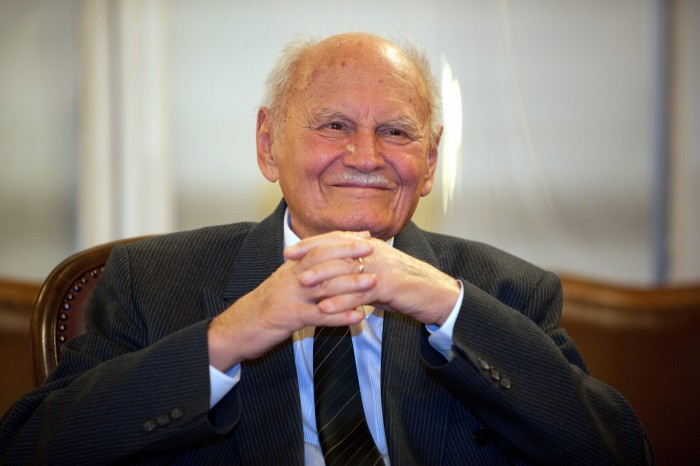Hungarian society is terribly splintered, polarized and immersed in a poisonous public discourse based on fear. But can today’s news of the death of Árpád Göncz, by far the most popular President of Hungary, who served under three different governments and for a full decade, bring Hungarians together and put a brief damper on the spiteful political polemics? All the major political parties expressed their condolences at the news of Mr. Göncz’s death, who turned 93 this year. In addition to playing a key role in the transition to democracy in 1990 and serving as Hungary’s first democratic head of state since 1945, Árpád Göncz was an accomplished writer, translator and playwright. His anthology entitled Homecoming, includes a selection of English-language stories and vignettes, which compellingly recount the tumultuous episodes of twentieth century history in Hungary. This was one of the first books I ever read on a subject pertaining to twentieth century Hungarian history, culture and society. As a teenager living in Budapest, I was looking for any opportunity to buy English language books that were not those Wordsworth re-prints of English classics, which seemed to be most abundant in the small handful of English-language bookstores in and around Váci utca.
Árpád Göncz had much to say to a generation who did not live through the Second World War, the Holocaust and Stalinism. Mr. Göncz, as a young man, participated in the antifascist resistance in 1944/1945, he then joined the Smallholders’ Party, which won in Hungary’s first free and fair postwar elections. After the Smallholders were disbanded by the communists, he became a manual labourer. He participated actively in the 1956 Hungarian Revolution and after it was crushed, he was sentenced to life in prison. Mr. Göncz received amnesty in 1963, along with other political prisoners, and this is when his own career as a prominent translator of American and British literature took off. He introduced authors like Aldous Huxley, William Faulkner, Willian Golding, Ernest Hemingway, D.H. Lawrence, W. Somerset Maugham and John Updike to Hungarian audiences.
Starting in the late eighties, he became aligned with the anti-communist and liberal Alliance of Free Democrats (SZDSZ), a party which is now defunct, and upon his election by parliament as President of the Republic of Hungary in 1990, he described his worldview like this:
“If I wish to serve anyone, then I know that I must serve those who keep no servants. I must serve the vulnerable. I must serve those who have not been recipients of a single kind word, both in the world of the nobility, who wore feathers in their hats, and also in the world where some were more equal than others.”
Mr. Göncz summarized beautifully his role as the President of Hungary, post-1989. He could not go back to the pre-1945 semi-feudal Kingdom of Hungary, nor could he revive the days of the People’s Republic. Hungary had to chart a new course. He also represented the underpinnings of the Third Republic of Hungary, as expressed in its constitution, namely that Hungary was to become a socially-conscious free market, where those who live on the margins are not forgotten by the state and society.
When asked about the most important day in modern Hungarian history, Mr. Göncz referred to the reburial of martyred Hungarian Prime Minister Imre Nagy. His reburial occurred on national television on June 16, 1989. “It was remarkable, when Imre Mécs asked the three hundred thousand people present to hold each other’s hands. These were symbolic moments. And I have to say, that everyone who spoke, was in tears. We sat there next to each other and wept, like children, because it was all so unbelievable. It was the moment of enlightenment and closure, at the very same time,” he recalled.
When the news of Mr. Göncz’s death became public today, political leaders from both sides of the aisle shared their memories. Prime Minister Viktor Orbán was among the first, noting that the former president was “an active and important participant of the years during which Hungary began walking down the road from dictatorship to democracy. ” József Tóbiás, leader of the Hungarian Socialist Party (MSZP), referred to Mr. Göncz as “a symbol of national unity.” The Együtt (Together) centre-left opposition party noted that Árpád Göncz was “an example of humanity.”
That’s something very sorely missed in contemporary Hungarian discourse. Hopefully, the former president’s death will help people to refocus.




